All children deserve a quality education. Together, we can help them reach their dreams.
Learn more about Teach for Life, the educational branch of Trees for Life.

Guatemala
Victor's face shone with pride and anticipation. The sun beamed gold beauty on the mountains surrounding him. The lines on his face deepened as he smiled with excitement, watching dozens of uniformed school children hike up a dirt path carrying hoes and machetes to the field where he stood.
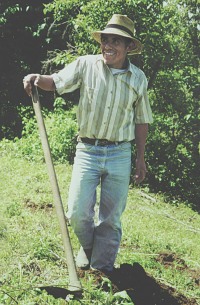
Serving his people, Victor Lopez Cua uses his agricultural experience and training to help children in Guatemala strengthen their community and care for the land.
This morning was the first day of a new project at Santos de los Inocentes ("Holy Innocents") School in the village of Parramos, Guatemala. In this project, Trees for Life would join hands with Sisters of St.Francis, the Church of the Brethren, and a friend from New York.
Parramos was the first community I had worked in as a Trees for Life volunteer starting in 1991, so I knew what the local native Mayan people had gone through. In the 1980s, many had fled from their homeland to escape the brutal violence of the civil war. Even now there is a general sense of lawlessness.
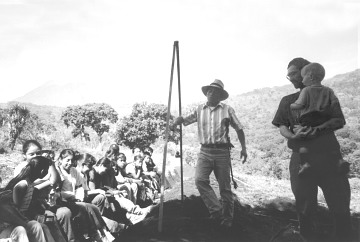
"This project earns much-needed income for a school, and helps students learn how to better care for the environment while improving their health through nutrition." ? Tom Benevento (far right, holding son Zach)
Most families farm tiny bits of land on steep mountain sides. Rain washes soil off the mountain slopes, making the land barren. Other villagers work as day laborers, perhaps receiving three dollars a day for hard work in very poor conditions.
Victor himself had been hard hit. His wife Lucela died of cancer, which he suspected was related to her years of labor on a large plantation where pesticides were sprayed openly. Victor carried on, a 40-year-old widowed father with children to feed.
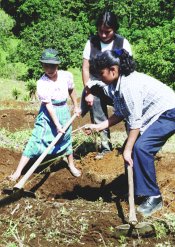
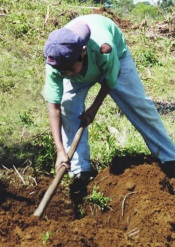
"Laughing and sweating, the children dug holes, carried compost, and carefully planted trees."
Watching Victor and the students now, one could not have guessed their history. With the children seated around him, Victor began to teach with ease and joy. He explained that together they would be restoring an eroded, deforested piece of land using techniques of their Mayan ancestors.
With the worn hands of a farmer and the insight of a trained teacher, he carefully demonstrated how to create swales ? deep ditches following the contours of the hillside to prevent erosion. Next, he taught techniques for tree planting.
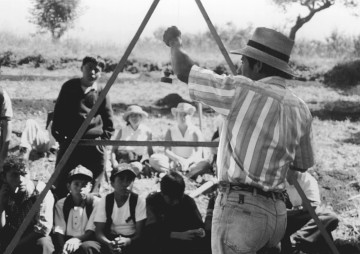
Valuable skills are learned as Victor teaches students how to restore an eroded, deforested piece of land using techniques of their Mayan ancestors.
Then the students began applying their lessons. They skillfully wielded machetes and hoes as they planted macadamia nut trees. These trees will live more than 150 years, providing a source of nutrition and income.
Laughing and sweating, the children dug holes, carried compost, and carefully planted trees. By the end of the class they had built swales and planted more than 100 trees.
They had started an edible "food forest" that will mimic the layers of a natural forest and will be rich with fruit trees such as lemons, oranges and avocados. It will also have soil rejuvenation plants, and three cash crops: chrysanthemum, macadamia nut and coffee. The profits from these will provide funds to help keep the school running.
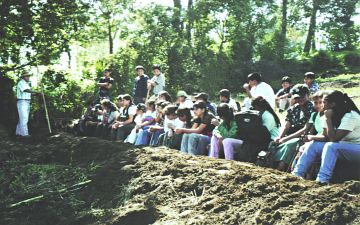
Teachers of tomorrow, the students will pass on the knowledge they gainto children at two other schools and help them start similar projects.
"For the last two years," Victor told me, "the school has been on the brink of closing due to lack of funds. Several times teachers have waited two or three months without pay, but they persevered with their dedication to provide a decent education for the children." Victor explained that the next week another class would come and continue the work. Once the forest reaches full production, in about four years, the school has pledged to help two other schools in their region begin a similar project. The students of today will become teachers tomorrow.
As he watched the line of students walk down the hill, Victor said, "I am grateful for this project. It gives me hope that my children can continue to attend Santos de los Inocentes School. Because of the money it will earn, the school will remain open, and the children will have better food. And most importantly, they will learn how to care for la Santa Tierra ('the Holy Earth')."
As I looked at Victor and the students, I knew he had summed up my feeling as well: grateful, truly grateful.